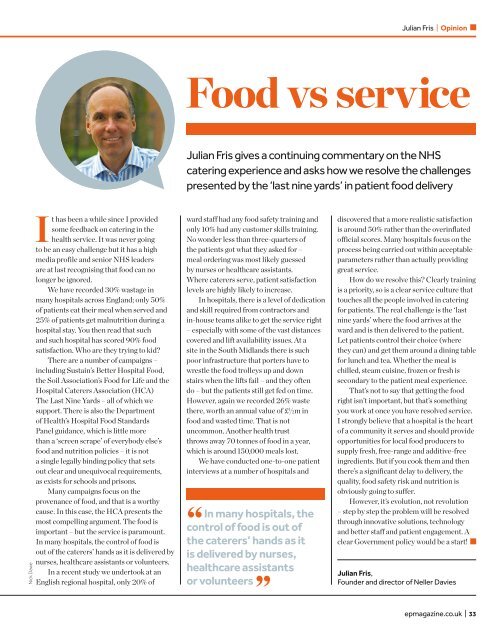EP Business in Hospitality Issue 53 - April 2015
EP magazine provides a reference point for executives on topical issues which may impact business growth, industry structure, professional and skill development, and broader economic and political changes. The magazine reports on all sectors of the industry, including hotels, restaurants, events and foodservice (contract catering).
EP magazine provides a reference point for executives on topical issues which may impact business growth, industry structure, professional and skill development, and broader economic and political changes. The magazine reports on all sectors of the industry, including hotels, restaurants, events and foodservice (contract catering).
You also want an ePaper? Increase the reach of your titles
YUMPU automatically turns print PDFs into web optimized ePapers that Google loves.
Julian Fris | Op<strong>in</strong>ion<br />
Food vs service<br />
Julian Fris gives a cont<strong>in</strong>u<strong>in</strong>g commentary on the NHS<br />
cater<strong>in</strong>g experience and asks how we resolve the challenges<br />
presented by the ‘last n<strong>in</strong>e yards’ <strong>in</strong> patient food delivery<br />
Nick Dawe<br />
It has been a while s<strong>in</strong>ce I provided<br />
some feedback on cater<strong>in</strong>g <strong>in</strong> the<br />
health service. It was never go<strong>in</strong>g<br />
to be an easy challenge but it has a high<br />
media profile and senior NHS leaders<br />
are at last recognis<strong>in</strong>g that food can no<br />
longer be ignored.<br />
We have recorded 30% wastage <strong>in</strong><br />
many hospitals across England; only 50%<br />
of patients eat their meal when served and<br />
25% of patients get malnutrition dur<strong>in</strong>g a<br />
hospital stay. You then read that such<br />
and such hospital has scored 90% food<br />
satisfaction. Who are they try<strong>in</strong>g to kid?<br />
There are a number of campaigns –<br />
<strong>in</strong>clud<strong>in</strong>g Susta<strong>in</strong>’s Better Hospital Food,<br />
the Soil Association’s Food for Life and the<br />
Hospital Caterers Association (HCA)<br />
The Last N<strong>in</strong>e Yards – all of which we<br />
support. There is also the Department<br />
of Health’s Hospital Food Standards<br />
Panel guidance, which is little more<br />
than a ‘screen scrape’ of everybody else’s<br />
food and nutrition policies – it is not<br />
a s<strong>in</strong>gle legally b<strong>in</strong>d<strong>in</strong>g policy that sets<br />
out clear and unequivocal requirements,<br />
as exists for schools and prisons.<br />
Many campaigns focus on the<br />
provenance of food, and that is a worthy<br />
cause. In this case, the HCA presents the<br />
most compell<strong>in</strong>g argument. The food is<br />
important – but the service is paramount.<br />
In many hospitals, the control of food is<br />
out of the caterers’ hands as it is delivered by<br />
nurses, healthcare assistants or volunteers.<br />
In a recent study we undertook at an<br />
English regional hospital, only 20% of<br />
ward staff had any food safety tra<strong>in</strong><strong>in</strong>g and<br />
only 10% had any customer skills tra<strong>in</strong><strong>in</strong>g.<br />
No wonder less than three-quarters of<br />
the patients got what they asked for –<br />
meal order<strong>in</strong>g was most likely guessed<br />
by nurses or healthcare assistants.<br />
Where caterers serve, patient satisfaction<br />
levels are highly likely to <strong>in</strong>crease.<br />
In hospitals, there is a level of dedication<br />
and skill required from contractors and<br />
<strong>in</strong>-house teams alike to get the service right<br />
– especially with some of the vast distances<br />
covered and lift availability issues. At a<br />
site <strong>in</strong> the South Midlands there is such<br />
poor <strong>in</strong>frastructure that porters have to<br />
wrestle the food trolleys up and down<br />
stairs when the lifts fail – and they often<br />
do – but the patients still get fed on time.<br />
However, aga<strong>in</strong> we recorded 26% waste<br />
there, worth an annual value of £ 1 /2m <strong>in</strong><br />
food and wasted time. That is not<br />
uncommon. Another health trust<br />
throws away 70 tonnes of food <strong>in</strong> a year,<br />
which is around 150,000 meals lost.<br />
We have conducted one-to-one patient<br />
<strong>in</strong>terviews at a number of hospitals and<br />
“<br />
In many hospitals, the<br />
control of food is out of<br />
the caterers’ hands as it<br />
is delivered by nurses,<br />
healthcare assistants<br />
or volunteers<br />
”<br />
discovered that a more realistic satisfaction<br />
is around 50% rather than the over<strong>in</strong>flated<br />
official scores. Many hospitals focus on the<br />
process be<strong>in</strong>g carried out with<strong>in</strong> acceptable<br />
parameters rather than actually provid<strong>in</strong>g<br />
great service.<br />
How do we resolve this? Clearly tra<strong>in</strong><strong>in</strong>g<br />
is a priority, so is a clear service culture that<br />
touches all the people <strong>in</strong>volved <strong>in</strong> cater<strong>in</strong>g<br />
for patients. The real challenge is the ‘last<br />
n<strong>in</strong>e yards’ where the food arrives at the<br />
ward and is then delivered to the patient.<br />
Let patients control their choice (where<br />
they can) and get them around a d<strong>in</strong><strong>in</strong>g table<br />
for lunch and tea. Whether the meal is<br />
chilled, steam cuis<strong>in</strong>e, frozen or fresh is<br />
secondary to the patient meal experience.<br />
That’s not to say that gett<strong>in</strong>g the food<br />
right isn’t important, but that’s someth<strong>in</strong>g<br />
you work at once you have resolved service.<br />
I strongly believe that a hospital is the heart<br />
of a community it serves and should provide<br />
opportunities for local food producers to<br />
supply fresh, free-range and additive-free<br />
<strong>in</strong>gredients. But if you cook them and then<br />
there’s a significant delay to delivery, the<br />
quality, food safety risk and nutrition is<br />
obviously go<strong>in</strong>g to suffer.<br />
However, it’s evolution, not revolution<br />
– step by step the problem will be resolved<br />
through <strong>in</strong>novative solutions, technology<br />
and better staff and patient engagement. A<br />
clear Government policy would be a start!<br />
Julian Fris,<br />
Founder and director of Neller Davies<br />
epmagaz<strong>in</strong>e.co.uk | 33

















